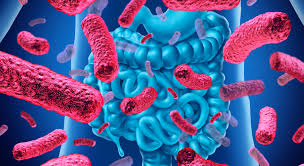
Probiotics for Acid Reflux: Strains That Show Promise
|
|
Time to read 5 min
|
|
Time to read 5 min
Acid reflux is usually treated by lowering stomach acid, but that doesn’t address the role of gut bacteria. Emerging research suggests that probiotics may help by improving motility, reducing inflammation, and balancing the microbiome. In this guide, we’ll explore how probiotics might help with acid reflux, the specific strains showing the most promise, and how you can start incorporating them into your wellness routine.
Disclaimer: The information provided in this blog post is for general knowledge and informational purposes only, and does not constitute medical advice. Always consult with a qualified healthcare professional before making any decisions about your health or treatment. If you experience persistent or severe acid reflux, seek medical attention immediately.
Before we dive into probiotics, let’s break down what acid reflux actually is. Acid reflux happens when stomach acid flows back into the esophagus - the tube connecting your mouth to your stomach. The most common symptom is heartburn, but other signs include:
Regurgitation (that unpleasant sour or bitter taste)
Bloating and gas
Difficulty swallowing
Persistent cough or sore throat
Chronic acid reflux, often called GERD (Gastroesophageal Reflux Disease) , can cause long-term damage if left untreated.
Acid reflux occurs when stomach contents move backwards into the esophagus. The lower esophageal sphincter (LES) usually prevents this, but when it weakens, reflux symptoms develop. Emerging research suggests the gut microbiome may influence acid reflux by regulating gut motility, affecting gas production, and modulating inflammation.
Gas production: Overgrowth of fermenting bacteria can increase pressure inside the stomach, pushing acid upward.
Inflammation: Dysbiosis (imbalanced bacteria) may promote low-grade inflammation that worsens reflux symptoms.
This has led to growing interest in probiotics as a complementary approach for managing acid reflux symptoms.
Not all probiotics have the same effects. Selecting strains supported by scientific research is important for improving acid reflux and digestive health.
This specific strain of L. reuteri is naturally found in the human stomach and has been extensively studied. Clinical trials indicate that L. reuteri DSM 17938 can reduce gastric inflammation, improve gastric motility, and enhance lower esophageal sphincter (LES) tone, helping to reduce acid reflux and regurgitation episodes, especially in infants.
This strain produces antimicrobial compounds that help reduce the overgrowth of harmful bacteria in the stomach. Clinical research has demonstrated that L. gasseri OLL2716 improves gastric emptying, thereby lowering the pressure inside the stomach that contributes to acid reflux.
This specific probiotic strain, B. bifidum YIT 10347, has been studied for its beneficial effects on upper gastrointestinal symptoms, including acid reflux and gastritis linked to Helicobacter pylori infection. Research shows that it adheres strongly to the gastric mucosa, potentially protecting the stomach lining and reducing gastric inflammation.
This probiotic yeast strain is widely used for its ability to stabilize the gut barrier and reduce intestinal inflammation. Although direct studies on acid reflux are limited, Saccharomyces boulardii CNCM I-745 supports gut health by restoring microbial balance after antibiotic use or dysbiosis, which may indirectly benefit reflux symptoms linked to gut microbiome imbalance.
If you’re considering probiotics for acid reflux, keep these points in mind:
Start low and go slow: Some people experience gas or bloating when they first introduce probiotics.
Consistency matters: Benefits are usually seen after 4-8 weeks of regular use.
Check the strain: Not every probiotic supplement contains the specific strains linked to reflux support. Look for clinical evidence.
Pair with lifestyle changes : Probiotics are not a substitute for avoiding triggers like late-night meals, alcohol, or high-fat foods.
Note: Before starting probiotics, consult your healthcare provider, especially if you have underlying health conditions. Remember, probiotics complement, but do not replace, lifestyle changes such as avoiding trigger foods and not eating late at night.
At this stage, probiotics should be viewed as adjunctive therapy, not a replacement. Medications like proton pump inhibitors (PPIs) or H2 blockers remain the standard of care for moderate to severe acid reflux.
However, probiotics may offer added support for:
Mild symptoms
People tapering off acid-suppressing medications
Gut balance after long-term PPI use (which may alter microbiota)
Acid reflux is influenced not only by acid but also by gut bacteria and motility..
Strains like L. gasseri, L. reuteri, and B. bifidum show the most promise in early studies.
Probiotics are best used as a supportive measure alongside diet and lifestyle changes.
More high-quality trials are needed before probiotics can be considered a frontline treatment.
Ready for personalized relief for acid reflux? Complete Claisen's gut health quiz to identify your unique acid reflux triggers and receive evidence-based recommendations tailored to your digestive profile.
No. Probiotics may reduce symptoms and support gut balance, but they are not a cure. They work best as part of a broader management plan.
Most studies suggest 4-12 weeks of consistent daily use is needed to see improvements.
For most healthy adults, yes. People with compromised immune systems or severe illnesses should consult a doctor first.
Yes. Fermented foods like yogurt with live cultures, kefir, kimchi, and sauerkraut can provide beneficial bacteria. However, supplements are often used in studies because they provide specific strains at consistent doses.
No. Always talk to your healthcare provider before making changes to prescribed medication. Probiotics may complement, but not replace, standard treatment.




